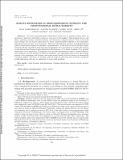Robust Estimators in High-Dimensions Without the Computational Intractability
Author(s)
Diakonikolas, Ilias; Kamath, Gautam; Kane, Daniel; Li, Jerry; Moitra, Ankur; Stewart, Alistair; ... Show more Show less
DownloadPublished version (1004.Kb)
Terms of use
Metadata
Show full item recordAbstract
We study high-dimensional distribution learning in an agnostic setting where an adversary is allowed to arbitrarily corrupt an ϵ-fraction of the samples. Such questions have a rich history spanning statistics, machine learning, and theoretical computer science. Even in the most basic settings, the only known approaches are either computat ionally inefficient or lose dimensiondependent factors in their error guarantees. This raises the following question: Is high-dimensional agnostic distribution learning even possible, algorithmically? In this work, we obtain the first computationally efficient algorithms with dimension-independent error guarantees for agnostically learning several fundamental classes of high-dimensional distributions: (1) a single Gaussian, (2) a product distribution on the hypercube, (3) mixtures of two product distributions (under a natural balancedness condition), and (4) mixtures of spherical Gaussians. Our a lgorithms achieve error that is independent of the dimension, and in many cases scales nearly linearly with the fraction of adversarially corrupted samples. Moreover, we develop a general recipe for detecting and correcting corruptions in high-dimensions that may be applicable to many other problems. ©2019 Society for Industrial and Applied Mathematics.
Description
from Special Section of the SIAM Journal on Computing. "Special Section on the Fifty-Seventh Annual IEEE Symposium on Foundations of Computer Science (FOCS 2016)"
Date issued
2019-04Department
Massachusetts Institute of Technology. Department of MathematicsJournal
SIAM Journal on Computing
Publisher
Society for Industrial & Applied Mathematics (SIAM)
Citation
Diakonikolas, Ilias et al., "Robust Estimators in High-Dimensions Without the Computational Intractability." SIAM Journal on Computing 48, 2 (April 2019): p. 742–864 doi. 10.1137/17M1126680 ©2019 Authors
Version: Final published version
ISSN
1095-7111